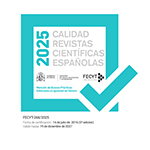Energetic connections. Francoist dam engineers as state agents constituted in international settings during the 1950s and 1960s
Abstract
they were political and social key figures and promotors of the ideology of progress for the government. Through the construction of large-scale projects, they contributed to Francoist economic success and were responsible for its major social consequences including the suffering of many. Dam constructing engineers where a prestigious elite in the discipline. Beginning form the 1950s, they sought to make Spain a respected partner on an international level again. To archive this aim they re-established contacts from the 1920s and 1930 (those form the colonial past included) and created new ones. Especially contacts to the USA but also to the USSR became central. On an international level engineers were connected through ideas, knowledge, personal contacts and the material they worked with. Dams become political objects in this context. This object enabled engineers to interact on technical-political missions through the iron curtain. Key for international contact and cooperation was engineer’s habitus. Shared values, ways of behaviour and interests created a medium of communication beside political obstacles which included a strong distinction and exclusion in terms of class and gender (race played at least in Spain a minor role). Habitus helped dam building engineers to create importance as a group in various political contexts. In Spain it helped to strengthen the technical, social, political and economic role of dam engineers. Those engineers played a significant part to consolidate the Francoist regime within the country and on an international level.
Downloads
Article download
License
Aquellos autores/as que tengan publicaciones con esta revista, aceptan los términos siguientes:
a. Los autores/as conservarán sus derechos de autor y garantizarán a la revista el derecho de primera publicación de su obra, el cuál estará simultáneamente sujeto a la Licencia de reconocimiento de Creative Commons Reconocimiento-No comercial-Sin obra derivada 4.0 España que permite a terceros compartir la obra siempre que se indique su autor y su primera publicación esta revista.
b. Los autores/as podrán adoptar otros acuerdos de licencia no exclusiva de distribución de la versión de la obra publicada (p. ej.: depositarla en un archivo telemático institucional o publicarla en un volumen monográfico) siempre que se indique la publicación inicial en esta revista.
Plagio y fraude científico
La publicación de un trabajo que atente contra los derechos de propiedad intelectual será responsabilidad de los autores/as, que serán los que asuman los conflictos que pudieran tener lugar por razones de derechos de autor. Los conflictos más importantes pueden darse por la comisión de plagios y fraudes científicos.
Se entiende por plagio:
1.Presentar el trabajo ajeno como propio.
2.Adoptar palabras o ideas de otros autores sin el debido reconocimiento.
3.No emplear las comillas u otro formato distintivo en una cita literal.
4.Dar información incorrecta sobre la verdadera fuente de una cita.
5.El parafraseo de una fuente sin mencionar la fuente.
6.El parafraseo abusivo, incluso si se menciona la fuente.
Las prácticas constitutivas de fraude científico son las siguientes:
1.Fabricación, falsificación u omisión de datos y plagio.
2.Publicación duplicada.
3.Conflictos de autoría.












